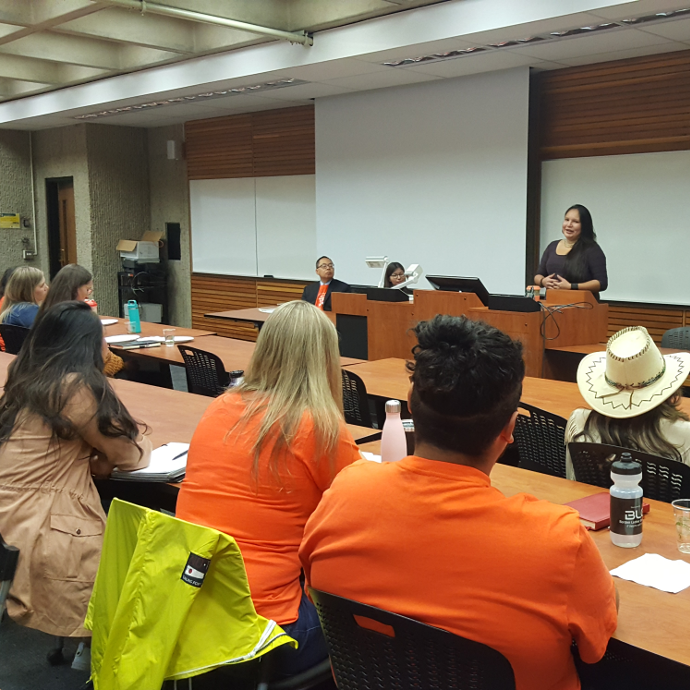
Students and other members of the University of Alberta Faculty of Law community gathered to increase their awareness and understanding of Canada's Sixties Scoop during an emotion-laden noon-hour presentation on Orange Shirt Day.
The speakers were UAlberta sociology student Kyla George, one of the youngest survivors of the Sixties Scoop, and lawyer Robert P. Lee, both of whom have deep knowledge of the government-sanctioned child welfare policy practice in which Indigenous children were apprehended from their communities and placed for foster care or adoption in primarily middle-class, Euro-Canadian families. The policy was developed and implemented from 1951 to 1991.
"Orange Shirt Day represents being raised by the enemy," said George, 29, who was born into the Mosquito Band in Saskatchewan but adopted by a white couple in a small town in the same province, in 1991.
George said that during her childhood she was taught to be loyal to white people and not to her extended Indigenous family. She grew up feeling her birth family was inferior to her adoptive family because it did not practise Christianity.
Her experience caused George to leave home to live on the streets at age 14, and "in leaving that home I was left with no family," she said, because until her late teens, she believed what she had been taught about Indigenous People. She did not reconnect with her birth family until she was well into her twenties. The Sixties Scoop not only harmed the children and parents involved, she said, but also subsequent children born to parents who were mourning their seized children.
That's an emotional toll that is hard to understand without people such as George telling their stories in public, said Lee, and Edmonton lawyer whose practice helps survivors of the Sixties Scoop achieve justice.
"People start being turned into numbers and statistics instead of individuals," he said."Kyla's experience is not an isolated one. It's really important to remember that not just hundreds or thousands, but tens of thousands of Indigenous children have been abused by our system.".
It is estimated that 20,000 children were removed from their biological families under the Sixties Scoop and although most were fostered or adopted by families in Canada, their new homes were sometimes hundreds or thousands of miles away. Some were placed in homes as far away as the United States and Western Europe.
"The terrible impact of the Sixties Scoop is still being felt within many individual lives, families, and Indigenous communities in the present day, " said Assistant Professor Darcy Lindberg, who teaches Indigenous Law in the Faculty.
"We still have members from our communities who have yet to 'come home.' This talk is vitally important as the policies that underpinned the Sixties Scoop have never really gone away, with Indigenous children making up half of the children in care in Canada today."
Orange Shirt Day is a legacy of the St. Joseph Mission Indian residential school commemoration event held in Williams Lake, B.C., in the spring of 2013. During that event, residential school survivor Phyllis Webstad related how her brand-new orange shirt was taken away on her first day of school at the Mission.
Wearing an orange shirt on September 30 has become an opportunity to keep a discussion open annually on all aspects of Indian residential schools and the impact the experiences there had on Indigenous survivors and their descendants.
